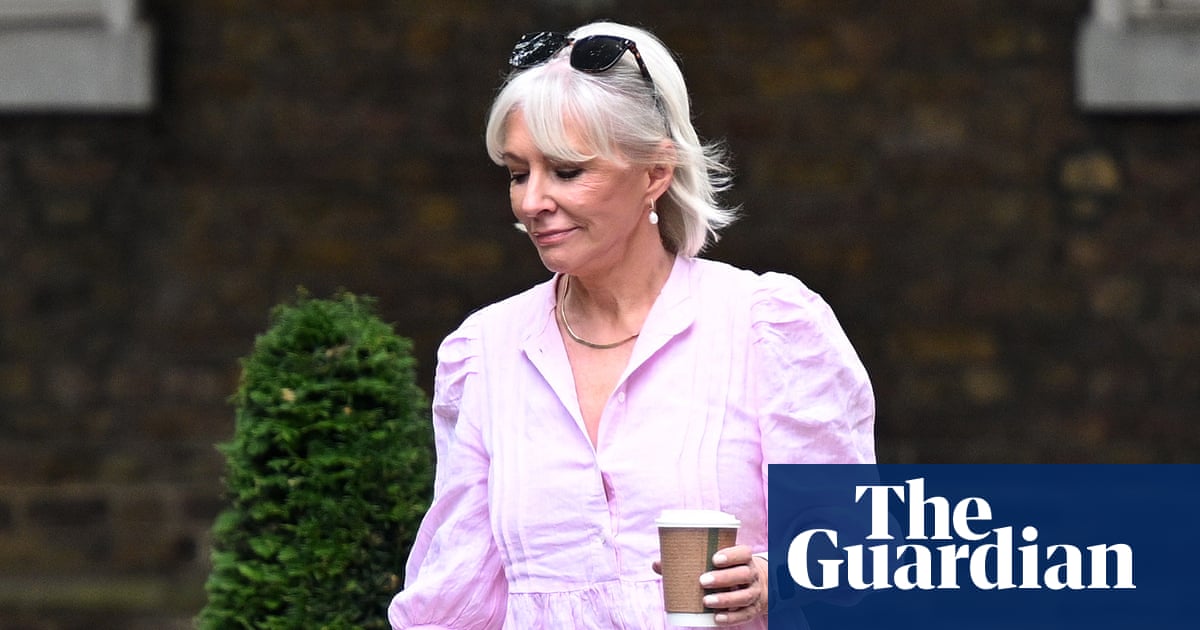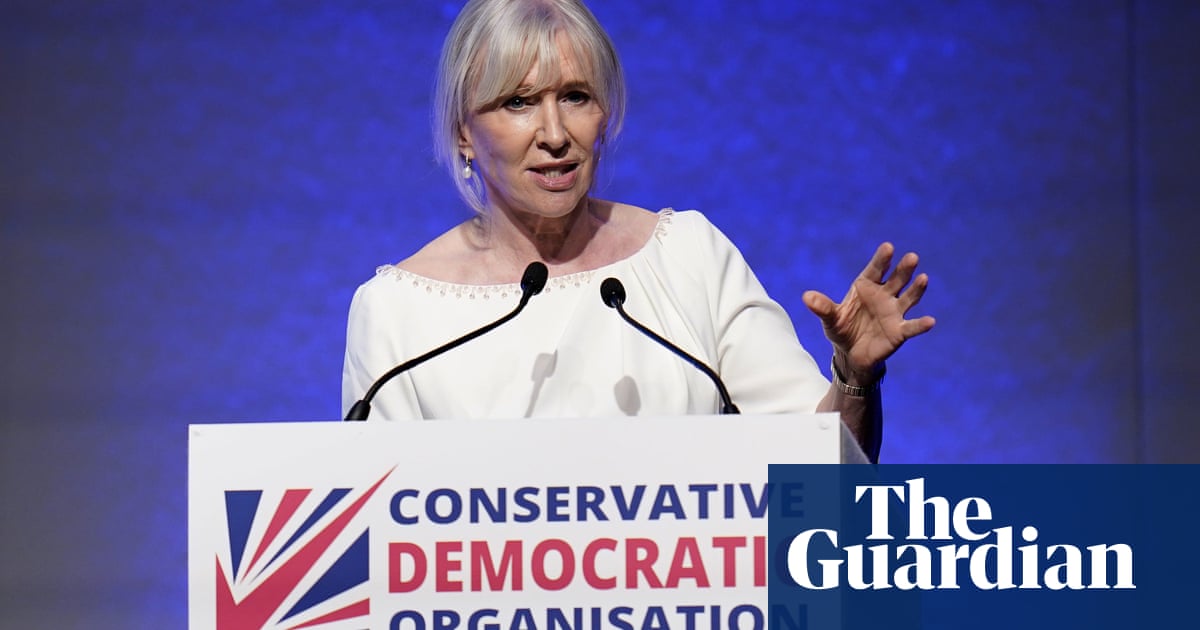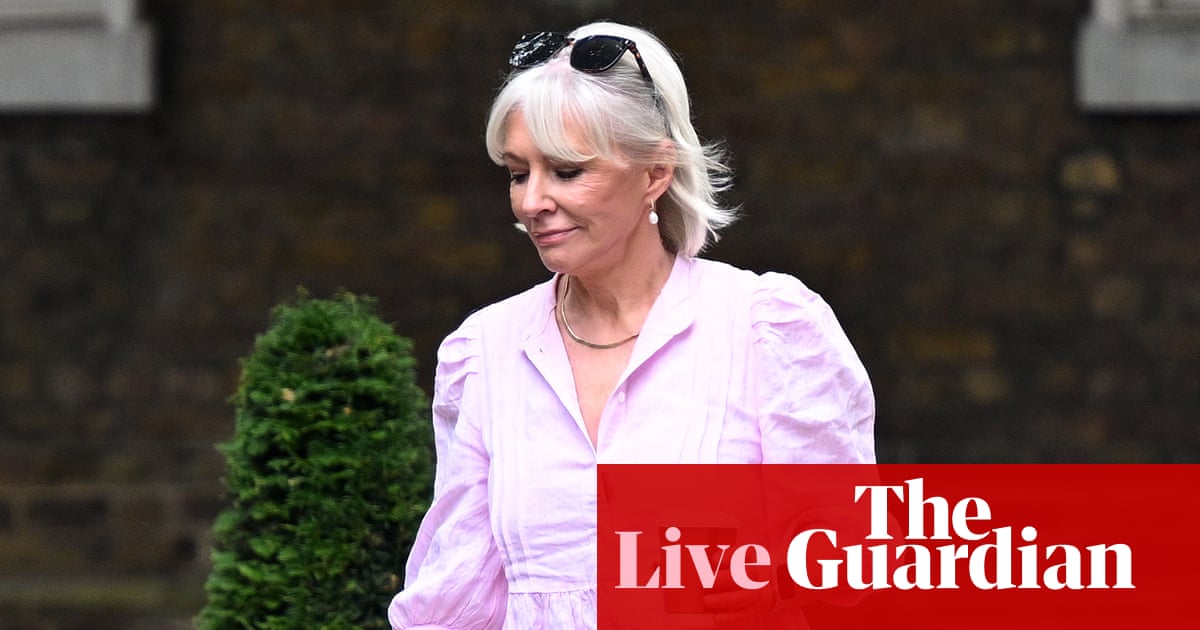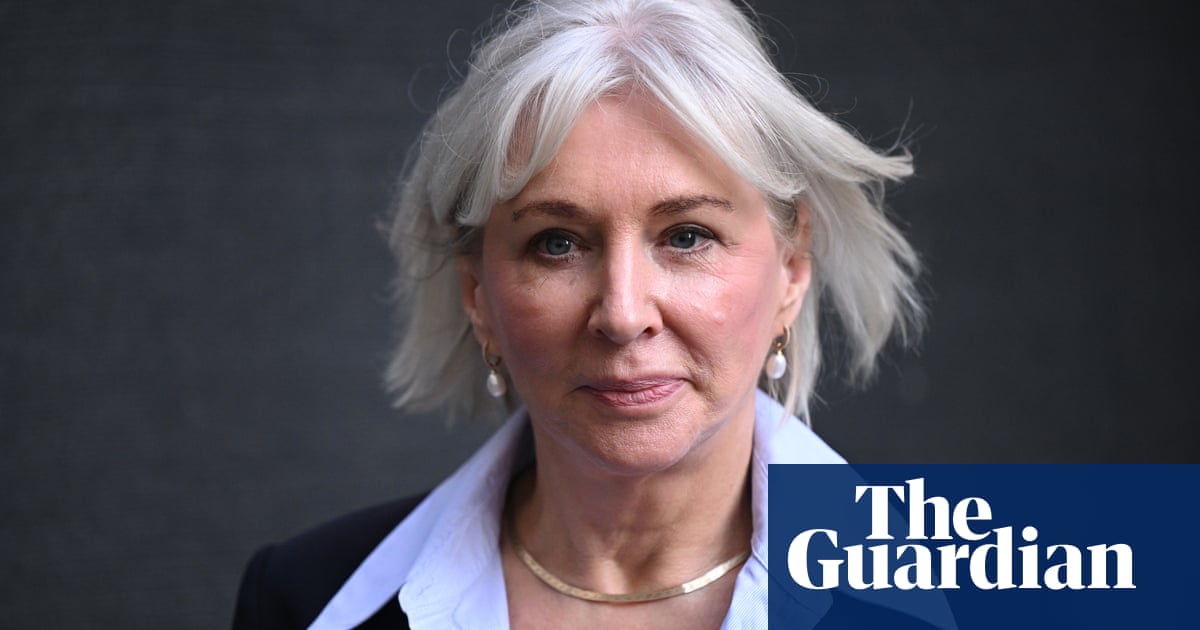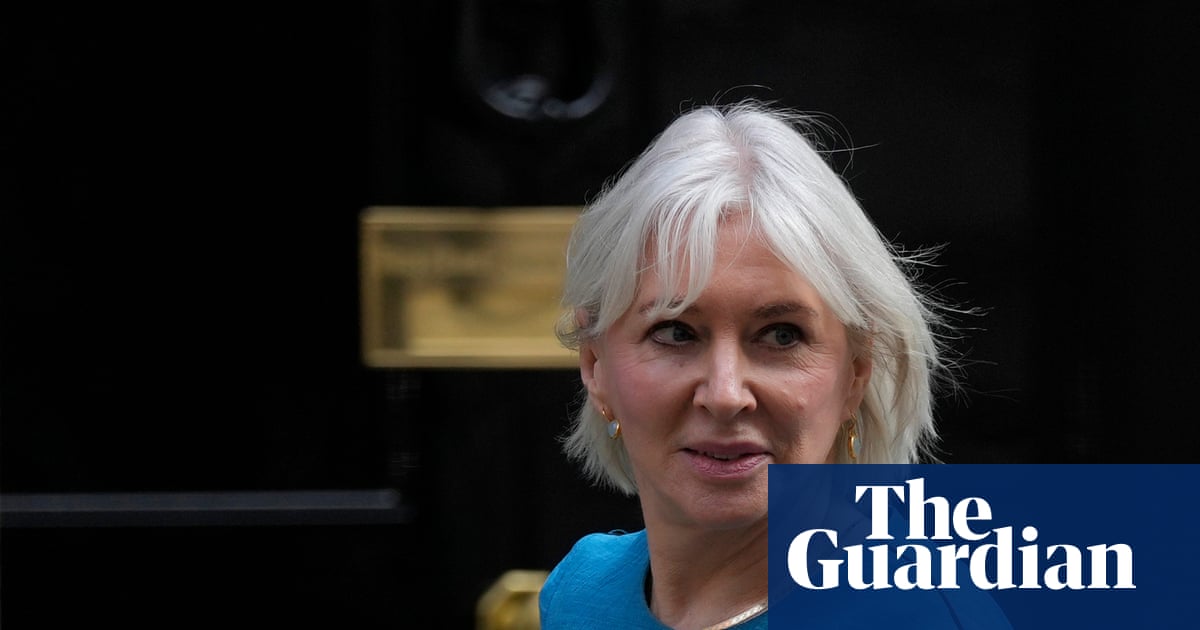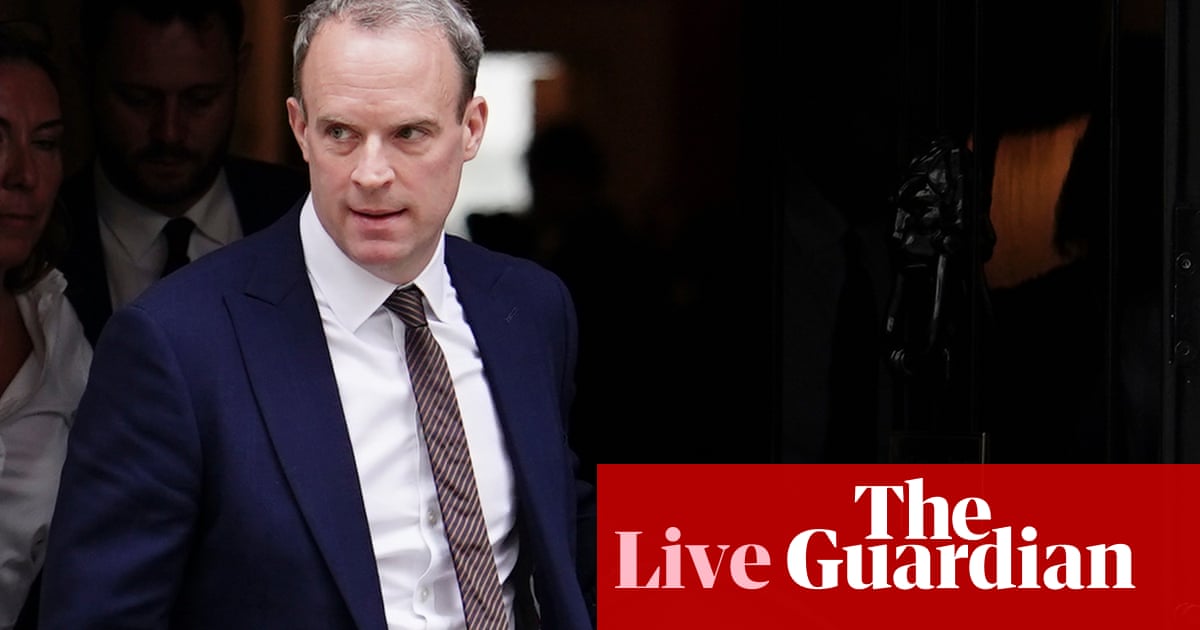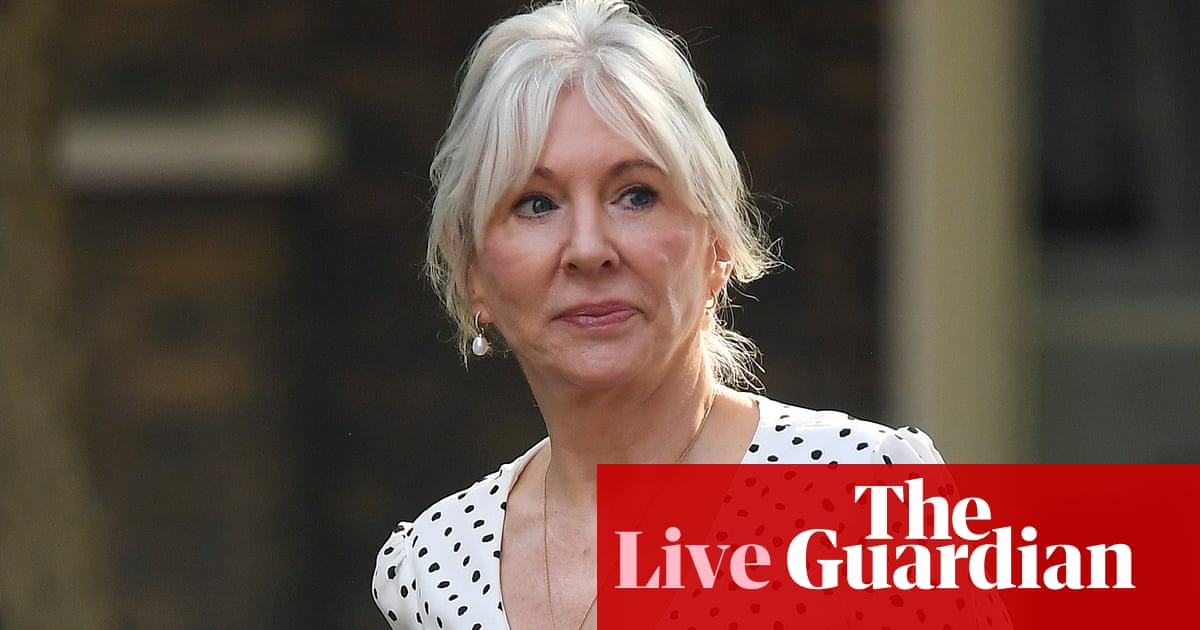
Dorries claims she is "working daily" on behalf of her constituents as calls for her resignation continue
Nadine Dorries has said she is “working daily” on behalf of her constituents. She made the comment in a statement she released to the News Agents podcast, in response to repeated claims, including from within her own party, that she should resign because she is neglecting her duty as an MP.
The controversy has been rumbling on for weeks now, and generally Dorries has not been responding to complaints about her record, or questions from the media. She has not addressed the issue in her Daily Mail column and, even though at one point she was a hyper-active user of Twitter, her recent activity on the platform has been very limited, and more focused on hedgehogs.
But Dorries told the News Agents she has not given up on her work as an MP. In the statement she said:
Myself and my team of four caseworkers are working daily with constituents. I understand that political opponents, such as Labour-run Flitwick town council, are choosing the summer and news hungry outlets in the summer recess to be noticed. However we are just getting on with the work.
Dorries last spoke in the Commons in July last year and she has only voted in the chamber six times this year. (Five of those votes took place on the same day.) There is no evidence she has been holding constituency surgeries recently, and journalists have struggled to find examples of work she has been doing in Mid Bedforshire for her constituents.
Even Rishi Sunak has said that Dorries is not representing her constituents properly.
Two town councils in the area have said she should resign immediately. One of them is Flitwick which, although described as Labour-run by Dorries, says it operates on a non-party basis.
Afternoon summary
Nadine Dorries has broken her silence to insist she is still working as an MP, after a colleague said she should be stripped of the Conservative whip.
Steve Barclay, the health secretary, has said the inquiry into the murders carried out by Lucy Letby must have the “full confidence” of victims’ families, in a fresh hint it will be upgraded into a statutory one. (See 4.54pm.)
NatWest Group’s ousted chief executive Alison Rose is in line for a pay package worth more than £2.4m, despite being forced to resign last month over a scandal linked to the threatened closure of Nigel Farage’s bank accounts.
The Conservative MP Tim Loughton has accused Greece of “blatant opportunism” in claiming ancient treasures such as the Parthenon marbles are not safe in the British Museum after thefts from the institution.
Britain’s policymakers have been put on recession alert after a closely watched measure of economic health showed the UK gripped by a Europe-wide slump in private sector activity.
The first “not for EU” labels have appeared on food products sold in Northern Ireland, in a sign for consumers of the changes resulting from the Windsor framework deal that updated the region’s post-Brexit arrangements.
Steve Barclay says Letby inquiry must have "full confidence" of victims" families, in hint it will be made statutory
Steve Barclay, the health secretary, has hinted that the government may upgrade the inquiry into the murders carried out by Lucy Letby into a statutory one.
Last week, when the Department of Health and Social Care announced an inquiry, it said a non-statutory inquiry would be “the most appropriate option, building on the approach taken in other cases” because it would be able to report more quickly.
But on Monday Downing Street said it was open to the idea of turning it into a statutory inquiry and today Barclay said:
As the prime minister has said, we’ll ensure that the legal framework for [the inquiry] has the full confidence of the families affected and I’ll be engaging with them on that – whether that’s on a statutory or non-statutory basis – to ensure that … issues such as whistleblowers, and other actions related to this case, are fully investigated …
We need to ensure that [the] inquiry has the full confidence of the families affected … And it’s the families that I am absolutely focused on in ensuring that their voices are heard.
Families of Letby’s victims have been calling for the inquiry to be beefed up into a statutory one so that it has the power to compel witnesses to give evidence. They believe that management at the Countess of Chester hospital, where Letby murdered babies, has been evasive in responding to their questions about how that was able to happen.
NatWest chief ousted over Nigel Farage accounts row in line for £2.4m payout
NatWest Group’s ousted chief executive Alison Rose is in line for a pay package worth more than £2.4m, despite being forced to resign last month over a scandal linked to the threatened closure of Nigel Farage’s bank accounts, Kalyeena Makortoff reports.
Dorries claims she is "working daily" on behalf of her constituents as calls for her resignation continue
Nadine Dorries has said she is “working daily” on behalf of her constituents. She made the comment in a statement she released to the News Agents podcast, in response to repeated claims, including from within her own party, that she should resign because she is neglecting her duty as an MP.
The controversy has been rumbling on for weeks now, and generally Dorries has not been responding to complaints about her record, or questions from the media. She has not addressed the issue in her Daily Mail column and, even though at one point she was a hyper-active user of Twitter, her recent activity on the platform has been very limited, and more focused on hedgehogs.
But Dorries told the News Agents she has not given up on her work as an MP. In the statement she said:
Myself and my team of four caseworkers are working daily with constituents. I understand that political opponents, such as Labour-run Flitwick town council, are choosing the summer and news hungry outlets in the summer recess to be noticed. However we are just getting on with the work.
Dorries last spoke in the Commons in July last year and she has only voted in the chamber six times this year. (Five of those votes took place on the same day.) There is no evidence she has been holding constituency surgeries recently, and journalists have struggled to find examples of work she has been doing in Mid Bedforshire for her constituents.
Even Rishi Sunak has said that Dorries is not representing her constituents properly.
Two town councils in the area have said she should resign immediately. One of them is Flitwick which, although described as Labour-run by Dorries, says it operates on a non-party basis.
SNP appoints Murray Foote as party"s new chief executive
A former newspaper editor and communications chief, who denounced the police investigation into the SNP’s finances as a “grotesque circus”, has been appointed the party’s new chief executive.
Murray Foote, a highly respected journalist who used to edit the Daily Record, replaces Peter Murrell, who resigned in a row over the publication of party membership figures after Foote, then head of media, stepped down because he had been given inaccurate information to share with journalists.
Murrell was later arrested and questioned by police as part of Operation Branchform, as was his wife, Nicola Sturgeon.
In an interview after the arrests, Foote challenged the merits of the police investigation, suggesting it could be “a wild goose chase” and that he did not believe it would result in any charges.
Announcing the appointment, the party said Foote had been appointed after a “rigorous, open recruitment process”.
The SNP business convener, Kirsten Oswald MP, said Foote was an “exceptional candidate in a strong field”. She went on:
His managerial experience and skills will enable him to hit the ground running in delivering for SNP members, including leading changes in governance and transparency in party headquarters.
Foote faces immediate challenges because the leadership contest to replace Sturgeon and the continuing police inquiry have thrown up significant concerns about party transparency and governance. An internal party review is continuing.
Will Sunak achieve his five promises and, if he doesn"t, does it matter?
Here is a good question from a reader. It is not straightforward, but it’s a quiet day and so there is time to go into it in some detail. That means this post is much longer than usual. I hope you don’t mind.
In your opinion, how likely is it (or otherwise) that Rishi Sunak will be able to meet all five of his pledges before the end of the year, or at least before the next general election? And how much do you think this will matter, politically speaking?
In fact, there are two questions.
Will Sunak meet his five pledges?
The five pledges were presented as priorities for the year when they were unveiled in January, but at the time Rishi Sunak said he only expected to meet two (the inflation and growth ones) in 2023. The timetable for the others, it was implied, was by the time of the election. But even here there was some ambiguity; for example, Sunak has always been evasive as to whether stopping the boats means all of them or some of them. That was for the public to decide, he said in January.
As for how he is doing, you could start by reading the Daily Telegraph’s pledge tracker. They say Sunak is making progress on two (inflation and small boats), and that on the other three has has not yet delivered.
Looking ahead to the next election, what might the situation be then?
Halving inflation: Sunak has an okayish chance of meeting this promise by the end of the year and, even if he fails, it might not be by much. By the time of an autumn election the issue may feel much less of a priority anyway. But, if inflation does fall, only 8% of people think it will be because of government policy. And, given that most voters wrongly think halving inflation means prices will stop going up, they may be disappointed when they realise it doesn’t.
Growing the economy: No 10 says it will define this pledge as being met if there is growth – even of just 0.1% – in the final quarter of this year, and that should be achievable. But to voters this would feel more like the economy flatlining, and there is risk of interest rate rises leading to the economy stumbling again next year.
Getting debt falling: The government has not said exactly what timeframe applies to this pledge, or what benchmark it will use (what if debt is still forecast to rise, but by less than expected?), and so there is ample scope for interpreting the figures in such a way as to claim a win. But the main problem with this pledge is that, outside the world of macroeconomics, almost no one has much interest in national debt statistics, or a clear understanding of their (sometimes tenuous) link to living standards.
Cutting NHS waiting lists: The headline NHS waiting list is still going up and, partly because of the strikes, Sunak will find it harder to turn this around before the election than he might have thought in January. But this is the pledge over which he has most control, because massive spending could make a difference. Waiting times also matter as much, or more, to patients than the length of the overall list, and there have been hints ministers will focus instead on these, where performance is better.
Stopping small boats: No one expects all small boat crossings to stop before the next election, but Sunak seems to hope that he will get credit for at least reducing numbers significantly. If the supreme court decides sending migrants to Rwanda is lawful, if deportations go ahead in more than token numbers, and if that does then have a deterrent effect (as ministers insist it might), then Sunak could chalk this up as an achievement. But these are very big ifs, and his language this week implied he expects progress by the election to be limited, or minimal.
If Sunak fails to meet his promises, does it matter?
The conventional view of democratic politics is that politicians get rewarded at the ballot box for doing good things and punished (voted out) if they govern badly. On this basis, promises, and whether politicians keep them, should matter.
But, unfortunately, the theory may be wrong. Voters are less discerning than policy specialists would like, and politicians get elected as much for who they are (ie values, identity etc) as for what they do. The book that makes this case best is probably Democracy for Realists by Christopher Achen and Larry Bartels, but other political scientists think the same way.
That does not mean pledges and promises don’t matter. They do. But whether or not they get kept is only part of what makes them useful.
Pledge statements like Sunak serve three functions.
1) They are a statement about what matters to a politician. When Sunak became PM, he wanted to make it clear that he had abandoned the ‘moon on a stick’ boosterism of his predecessors and that he was focused on realistic things that mattered. Sunak’s announcement achieved this (although he should have replaced the debt one with something more relevant to non-economists).
2) They are a campaign tool. Candidates and campaigners need to be able to explain clearly and simply what their party is actually doing. When Boris Johnson was PM, it was hard for them to say what they stood for because Johnson’s messaging kept changing and because of his weakness for vacuous slogans. With these pledges, Tories can at least make a case.
3) They can be used to build trust. If a politician makes a promise, and keeps it, that can replenish their stock of political capital. In that sense whether or not Sunak is seen to have kept his promises does matter.
But – the assessment as to whether or not a politician has kept a pledge is made by voters who have probably already formed a view as to their trustworthiness, and so the details of what is achieved may count for little. Donald Trump’s supporters don’t seem to mind that the wall on the Mexican border never got built. Tony Blair had five pledges in 1997, some of which were very modest. By the time of the election, he had not achieved the youth justice one. But he was on track to meet it a year later, and no one complained at all.
That’s why, whatever happens with the Sunak pledges, it probably won’t make much difference. Blair was popular in 2001, and he had credit in the bank. Sunak isn’t, and doesn’t.
By the time of the next election, it is likely that Sunak will be judged to have failed to achieve all his promises, and it is likely that he will lose. But, if so, that won’t be why he loses. Without the pledges, he might even be in a worse position.
Lib Dem leader Ed Davey says Sunak should "sack Dorries as Conservative MP"
The Lib Dem leader Ed Davey has been campaigning in Mid Bedfordshire today, ahead of the byelection that will take place if Nadine Dorries ever gets round to carrying out the commitment she made in June to resign as an MP “with immediate effect”. He said Rishi Sunak should sack Dorries as a Conservative MP (ie withdraw the whip) because of her refusal to resign. He said:
Rishi Sunak should have the guts to sack Nadine Dorries as a Conservative MP. His silence on this whole sorry saga has become deafening.
Yet again, he is a prime minister too weak to control the chaotic Conservative party.
People in Mid Bedfordshire are fed up with being so badly let down by an absentee MP and an out-of-touch Conservative government.
Families are struggling to see a GP and seeing their mortgages go through the roof, but Dorries is nowhere to be seen.
Every day Sunak fails to take action just confirms that this Conservative government is totally out of touch and taking people for granted.
Rishi Sunak is expected to carry out a reshuffle this year. At one point No 10 was keeping open the option of holding it straight after the Uxbridge, Selby and Somerton byelections, and more recently the assumption has been that it would happen after recess.
This morning in the Times Steven Swinford says that it is coming in two parts. He says that a limited reshuffle will take place soon, primarily to replace Ben Wallace, who is standing down as defence secretary, and that a wider reshuffle has been postponed until later in the year.
Christopher Hope from GB News says the mini-reshuffle is now expected at the end of the week. He says Sunak is expected to replace not just Wallace, but also Alister Jack, the Scottish secretary, Trudy Harrison, an environment minister, Will Quince, a health minister, and Dehenna Davison, a levelling up minister.
All five of these ministers have already announced they are leaving parliament at the next election.
Hope says:
NEW A mini-reshuffle among ministers is expected at the end of next week.
Tipped to leave the Cabinet are Defence secretary Ben Wallace and Scottish secretary Alister Jack. Both are quitting as MPs next year. @Steven_Swinford says there will be a wider reshuffle in October.
Environment minister Trudy Harrison, Health minister Will Quince and Levelling Up minister Dehenna Davison also set to leave HMG. All MPs quitting Parliament. Liam Fox, Penny Mordaunt, Anne Marie Trevelyan, Mark Harper are tipped to replace Ben Wallace.
New polling from Survation suggests Labour could win as many seats in Scotland at the next election as the SNP, the Times reports. In his story, Kieran Andrews reports:
The research found that, although the SNP is still narrowly ahead of Labour in terms of popular support, just two points separate the parties.
The SNP was backed by 37 per cent of the public, while 35 per cent said they intended to vote for Labour. This is the highest level of support for Sir Keir Starmer’s party since 2014, in polling undertaken by Survation, who carried out the research for True North, a strategic advisory firm.
It found that the Conservatives had the support of 17 per cent of people, the Liberal Democrats had 6 per cent and other parties had 5 per cent.
Analysis by Sir John Curtice, professor of politics at the University of Strathclyde, said this would leave the SNP and Labour each with 24 MPs under current boundaries.
Nadine Dorries should lose party whip if she does not resign, says senior Tory
Caroline Nokes, the Conservative MP who chairs the Commons women and equalities committee, has told Times Radio that if Nadine Dorries does not resign from parliament, as she said she would, she should lose the Tory whip. Nokes said:
She shouldn’t have the Tory whip if she’s made it plain that she no longer wishes to be a Conservative MP but can’t take that final step towards resignation. I think she needs to crack on and do that.
Withdrawing the whip would allow the Conservative party to register its disapproval of Dorries, who is facing growing criticism for not resigning as she said she would even though she appears to be doing little or no work on behalf of her constituents. But it would have no practical effect on Dorries – other than preventing her being a candidate at the next election, which presumably she does not want anyway.
And Damian Green, the former first secretary of state, told the same programme that Dorries should resign immediately. He said:
She’s not just damaging parliament, she is damaging her own reputation as well, I think. Having said she’s going to go, it would be in everyone’s interest if she just went.
More than one in five girls aged 16 in England in contact with mental health, learning disabilities or autism services, IFS says
The Institute for Fiscal Studies thinktank has published a detailed report today on inequalities in disability. It has summarised the findings in a thread on Twitter starting here, but perhaps the most astonishing finding is summed up in this chart. It shows that in 2021-22 in England more than one in five girls aged 16 were in touch with NHS mental health, learning disability or autism services – double the rate four years previously.
The IFS says:
The NHS Mental Health Bulletin reports that in 2014–15, 3.4% of the overall population in England had had contact with NHS-funded secondary mental health, learning disabilities and autism services in that year, and this figure had grown to 5.1% in 2019–20, and 5.8% in 2021–22. This increase has been even more pronounced among younger age groups, and even more so among girls. As [the chart shows], the proportion of girls aged 16 who are in contact with these services increased from 11.8% in 2017–18 (the earliest year of the data for children), to 17.0% in 2019–20 and 22.8% in 2021–22. This means that among girls aged 16, more than one in five were in contact with NHS mental health services in 2021–22, which is a near doubling of the rate just four years earlier.
The IFS says that some of the increase is likely to be driven by a reduction in the stigma attached to accessing mental health services. More research is needed, it says. But it says even if that were the case, the pressure placed on services remains a problem.
The extent to which changes in reported mental health issues, use of mental health services and receipt of disability benefits for mental health conditions are due to changes in people’s reporting rather than an increase in the rate of poor mental health remains an interesting question for further study. But one might argue that, regardless of the extent to which the reported increase in mental health issues is actually due to underlying changes in mental health, there is also a legitimate concern about the pressures on public services, which the administrative data confirm to be very real.
The Campaign for Family-Friendly Trains has praised two rail operators for taking “significant steps” towards making it easier for families with young children to use their services.
It praised Merseyrail and LNER as it published a scorecard ranking rail operators (or at least those who responded to its survey) according to their family-friendly facilities.
It says:
UK trains have been traditionally designed for business and commuter passengers, not for families with young children in pushchairs. The significant challenges of accessing trains with a pushchair exacerbates social exclusion, but when leisure trips drive rail revenue then the industry can no longer afford to overlook and undervalue the needs of families. There are still many opportunities for train operating companies across the UK to improve their offer to young families.
And here is the scorecard.
Referring to the two firms with the best record on this measure, the campaign says:
The fact that a long-distance operator (LNER) and a commuter network (Merseyrail) have both taken significant steps towards introducing family-friendly facilities and services illustrates the possibility for all train operating companies to make changes to improve the experience of families with young children.
Patrick Harvie, co-leader of the Scottish Green party, has warned of “toxic forces” resulting in a rise in homophobia after he was verbally abused on the street during a BBC interview.
Harvie was launching his party’s campaign for the Rutherglen and Hamilton West byelection yesterday when a man interrupted the interview, urging people not to vote for his party and calling him a “deviant”.
Harvie told BBC Scotland News:
Those who have cultivated this nasty kind of culture war against minorities need to take responsibility for verbal abuse like that but also for violence that we’ve seen rising against LGBT+ people.
Yesterday Humza Yousaf, the Scottish first minister, posted a message on Twitter saying the treatment of Harvie was “disgraceful, disgusting and completely unacceptable”.
I understand people hold strong views about politicians but there is simply no excuse, none whatsoever for bigotry and hatred aimed towards anyone.
Disgraceful, disgusting and completely unacceptable. Solidarity with @patrickharvie
Jack Straw and Matt Hancock join calls for Lucy Letby inquiry to be made statutory
Two former cabinet ministers have joined the growing chorus of people saying the inquiry into the Lucy Letby murders should be a statutory one.
Jack Straw, the Labour former cabinet minister (one of his jobs was justice secretary), told the Today programme this morning that the inquiry should have the power to compel witnesses to give evidence, which it won’t under the non-statutory basis currently proposed by the government. He said:
You can shame a lot of [witnesses] but you can’t shame them all, and there may be witnesses in the Letby case who really ought to be on the stand, who are the most vulnerable in terms of the positions they have taken, and who won’t be bothered about being shamed – they would rather be shamed for their absence than actually appear on the stand.
Being able to compel a witness is really very, very important.
Straw also said he did not accept the government’s claim that a statutory inquiry would take longer. He said:
There isn’t really any direct connection between whether an inquiry is judicially led with full powers and whether it is speedy.
And, in an article for the Times, Matt Hancock, the former Conservative health secretary, says this case is so serious that only a statutory inquiry will suffice. He says:
Steve Barclay, my successor as health secretary, was commendably rapid in proposing an independent inquiry after the verdicts were announced. I can understand, having stood in his shoes, why he favoured a non-statutory inquiry, as they can be faster and less expensive than full statutory inquiries.
But this case is too serious, the crimes too heinous, and the importance of leaving no stone unturned too great. Already the admirable doctors and managers who ended the cover-up have made very serious allegations about what happened. We have seen that Letby herself has refused to go to court for sentencing. We know there will be messages and paperwork that the inquiry needs to see, not just the official record but messages between decision-makers.
The Institute for Government thinktank has also called for a statutory inquiry. It has published an article by Emma Norris, its deputy director, saying “it is possible to combine the unique powers of a statutory inquiry to force individuals and institutions to cooperate, with the speed needed to make changes quickly”. She also says there is precedent for a non-statutory inquiry being upgraded to a statutory one.
In 2000, the non-statutory inquiry into the murders carried out by Harold Shipman was converted into a statutory inquiry after families successfully argued there should be a judicial review of the original decision. More recently, the Independent Inquiry into Child Sexual Abuse, the Brook House inquiry and the Post Office Horizon inquiry have all been upgraded from non-statutory to statutory inquiries to strengthen their powers.
Labour won"t give full details of its spending plans until final OBR report before election, McFadden says
And here are some more lines from Pat McFadden’s interview with Sky News this morning.
McFadden, the shadow chief secretary to the Treasury, said that shadow cabinet ministers all accepted the need for Labour to take a “responsible” approach to the public finances. That meant they accepted they would not just be able to “spend, spend, spend”, he said. He went on:
That message has come not just from Rachel Reeves and I, but also from Keir Starmer. And, to the credit of the shadow cabinet, I don’t think it’s one that they are resisting or punching back against. I think everyone recognises that responsibility is needed in the public finances.
McFadden said Labour’s spending policy would be governed by the fiscal rules it set out two years ago, which said that the government should only borrow for investment, not for day-to-day spending, and that it should get debt falling in the long term.
He rejected suggestions that Labour’s approach to the public finances amounted to a policy of austerity. “I don’t think we want austerity. But we do want responsibility,” he said.
He said that Labour would not publish details of its spending plans until after the publication of the final Office for Budget Responsibility report before the general election. He said the party needed to know what state the public finances were in before it made commitments. The OBR produces two reports a year, and the next ones will be published later this year, with the autumn statement, and in the spring, with the budget. McFadden said it was possible the next election might not happen until after next year’s autumn statement, when there will be a further OBR report. He said Labour would have to wait until all those “fiscal events” had happened until it knew “exactly what the public finances look like going into the election”. Asked when Labour would reveal its plans, if the election were in October, he said it would depend on whether there was an autumn statement first.
McFadden said Labour would not rule out giving more visas for Indian workers as part of trade deal
Kemi Badenoch, the business and trade secretary, is visiting India where she will be holding talks on the post-Brexit trade deal being negotiated. Kalyeena Makortoff has more on this on her business live blog. She reports:
Badenoch is heading to Jaipur, where G20 trade and investment ministers will be gathering for talks on Thursday and Friday. But reports from the FT (£) and BBC suggest that the UK trade minister will use it as an opportunity to try iron out “some quite significant issues” to the trade deal, which – if it’s successful - would be a significant feather in Tory ministers’ caps post-Brexit
It is hoped that an agreement could slash costly tariffs on UK exports, including cars and whisky. Meanwhile, India is looking for a deal that would help improve access for its own manufactured goods and services, as well as work visas.
However, both news outlets suggest it’s unlikely that a deal will be struck before the prime minister, Rishi Sunak, attends the G20 summit on 9-10 September in New Delhi, where he is expected to hold talks with his counterpart, Narendra Modi.
In his Sky News interview this morning, Pat McFadden, the shadow chief secretary to the Treasury, said a trade deal could potentially bring big benefits. He said India was about the UK’s 12th biggest trading partner, but that it could be a “huge trading partner”.
Asked whether Labour would be in favour of granting more visas to Indian workers in exchange for trade concessions, he said the party would not rule this out. He replied:
It depends what else is in the pot … You wouldn’t rule it out because you might have other interests that made that sensible. There are goods and services that we want to export to India that could create huge wealth in the UK if we got the chance to do that.
You’ve got to look at these things in the round. You can’t just say, where do we stand on visas without, for example, financial services. Or, for example, whisky exports. What’s in the pot in the round? Take a view of that and ask, ‘Is this deal in the interests of the UK?’ If it is, great. If it’s not, then don’t sign it for the sake of signing one. That’s the principle that should inform trade deals with major economies.
Labour says Tory calls for tax cuts based on better-than-expected borrowing figures pose ‘big risk’ to economy
Good morning. Westminister politics is largely on auto-pilot at this point in August and, for better or worse, most of the political establishment is in “out of office’” mode. But some visceral instincts never take a holiday, and so it was yesterday that, within hours of ONS figures coming out showing the budget deficit for July a bit lower than forecast by the Office for Budget Responsibility (OBR), Conservative rightwingers were calling for tax cuts.
The Financial Times has the best round-up. In their story, Valentina Romei and George Parker report:
Sir John Redwood, a former Tory cabinet minister, said the OBR had been “ridiculously pessimistic” in its forecasts and that Hunt should act swiftly to cut taxes and hold down public spending.
Redwood added that by cutting some businesses taxes — for example raising the VAT threshold for small companies — and reducing energy taxes, the economy could grow faster without fuelling inflation.
Sir Jacob Rees-Mogg, former business secretary, said the data exposed “the continued fail




